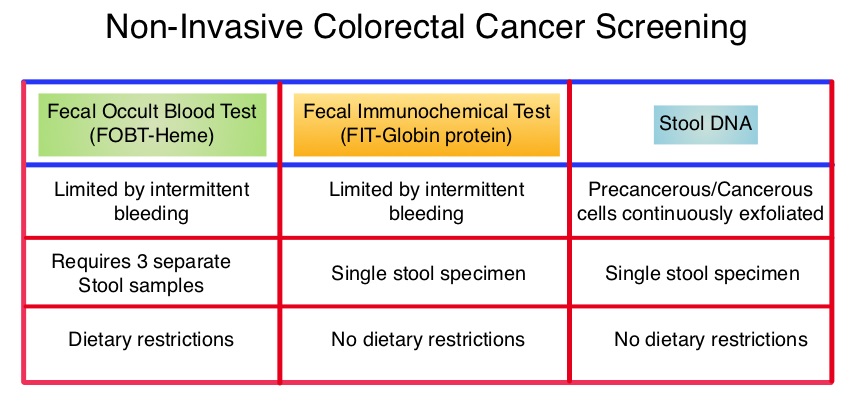The stool dna test is a noninvasive laboratory test that identifies dna changes in the cells of a stool sample.
Stool dna test vs fit.
Though it is often cited that cologuard has a sensitivity of 92 compared with fit s sensitivity of 74 it is important to.
Similar to fit it is a multi target test that detects tiny amounts of blood in the stool.
It also detects nine dna biomarkers in three genes found in colorectal cancer and pre cancerous advanced adenomas.
Fecal immunochemical test fit 30 of large polyps detected.
The stool dna test is a new method to screen for colon cancer.
Cologuard is the only stool dna screening test for detecting colon cancer that is approved by the food and drug administration fda.
Fit vs cologuard fit dna effectiveness convenience and cost are the three factors that determine which tests to pursue with a patient who is resistant to screening colonoscopy as well as flexible sigmoidoscopy or ct colonography.
Also fecal dna testing requires the entire stool specimen collected using a small bucket.
The test also detects hidden blood in the stool which can indicate the presence of.
If polyps are found during a colonoscopy they are removed during the same single procedure.
The fit dna test also referred to as the stool dna test combines the fit with a test that detects altered dna in the stool.
Fit is a stool test and can be ordered by your doctor.
Stool dna test fit dna the dna test is approved by the fda.
There is a combination stool dna fit test available.
The test looks for blood and abnormal dna in the stool that may indicate the.
A stool dna test also known as a multitargeted stool dna test mt sdna or fit dna looks for certain abnormal sections of dna from cancer or polyp cells and also for occult hidden blood.
Colorectal cancer or polyp cells often have dna mutations changes in certain genes.
Guidelines from the us multi society task force on colorectal cancer recommend the stool dna fit as a tier 2 test.
There are different kinds of fit tests both wet and dry.
Cologuard looks for changes in your dna that could indicate.
The stool dna test looks for abnormal dna associated with colon cancer or colon polyps.
It is done once every one or three years.
For this test the doctor puts a short.
Colonoscopy is the gold standard for finding polyps.
For this test you collect an entire bowel movement and send it to a lab where it is checked for cancer cells.
Stool dna cologuard 42 of large polyps detected.

